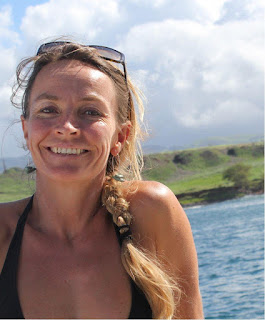Rebecca Stirling is the author of the new book The Shell and the Octopus: A Memoir. She lives in Aspen, Colorado, and Kauai, Hawaii.
Q: What inspired you to write your memoir, and over how long a period did you write it?
A: This story did not begin as a memoir. It did not even begin as my own story. I was asked by a close family friend, after his fourth bout with cancer, to write his story, because I knew it the best.
Charlie is now a character in my memoir. He inspired my father to go to Peng Chou and build a boat, and then to sail around the world with his family (me and for a short time, my mom). Charlie had sailed the same route we did, but had encountered pirates, typhoons, and was thrown into Changi Prison for carrying weapons (to defend himself).
When Charlie was released, my dad was inspired. So, a year later, Charlie, my mom, my dad, and toddler me, were hanging out at the shipyard in Peng Chau as our boat, The Cattle Creek, was built.
I lived on that boat on and off for 24 years, and wrote journals the entire time. When I tried to publish Charlie's story, mine came out. It was difficult to write, and also very cathartic. It took about seven years in total, including writing Charlie's story, disseminating mine from it.
Q: How would you describe your relationship with your father?
A: I loved my father. I adored him and almost glorified him. I realize now that we did not have a very healthy relationship, but I still miss him and admire the good in what he taught me.
Q: How was the book's title chosen, and what does it signify for you?
A: A friend showed me a shell that had a perfect circle drilled into it by an octopus beak. The fragile tendril of calcified support was still intact inside the shell, but the creature had been eaten. It reminded me of how we create shells to protect us, but they do not always work.
The octopus is a mysterious, shape shifting, intelligent, and beautiful creature. Like we can all be. It must survive though, and will do anything to do so.
Q: What do you hope readers take away from your book?
A: I hope readers gain a new, supportive perspective on many subjects this book touches on: womanhood, on the state of the earth and her climate, on plastic in the ocean, on women needing women and culture and weaving and dyes. On markets and cooking.
It speaks to the importance of taking care of yourself, family, culture and the earth. Of the mystery of living in a man's world. Of living within religions that intertwine and also clash. It touches on the need for family. For fidelity. For truth and love.
In writing this book, I realised that I had a new awareness of myself, and that I was OK, and so are you, even with the hidden parts and the secret past. I hope readers may take this with them.
Q: What are you working on now?
A: I am working on a new novel that juxtaposes how cultures, our lands, commercialism, and spirituality have worked together, and also been destroyed with the growth of colonialism, capitalism, and a more worldly community. I am also working on getting Charlie's sailing story out there again.
Q: Anything else we should know?
A: The writing of this story was a very painful and important healing process for me. I acknowledged that sailing, and my father, had in fact been a huge part of my life, and I missed them both.
I missed the passion, the adventure, the curiosity and acceptance, the magic and the beauty. I did not miss the drinking and too many women, and knew in my heart that the dysfunction did not have to be such a huge part of life.
--Interview with Deborah Kalb


No comments:
Post a Comment